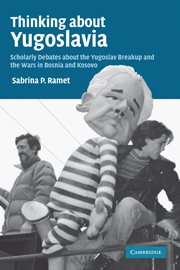 Thinking about Yugoslavia
Thinking about Yugoslavia Book contents
- Frontmatter
- Contents
- Preface
- List of books discussed
- Glossary
- 1 Debates about the war
- 2 The collapse of East European communism
- 3 The roots of the Yugoslav collapse
- 4 Who's to blame, and for what? Rival accounts of the war
- 5 Memoirs and autobiographies
- 6 The scourge of nationalism and the quest for harmony
- 7 Milošević's place in history
- 8 Dilemmas in post-Dayton Bosnia
- 9 Crisis in Kosovo/a (with Angelo Georgakis)
- 10 Debates about intervention
- 11 Lands and peoples: Bosnia, Croatia, Slovenia, Serbia
- 12 Southern republics: Macedonia and Montenegro in contemporary history
- 13 Conclusion: controversies, methodological disputes, and suggested reading
- Index
- References
8 - Dilemmas in post-Dayton Bosnia
Published online by Cambridge University Press: 22 September 2009
- Frontmatter
- Contents
- Preface
- List of books discussed
- Glossary
- 1 Debates about the war
- 2 The collapse of East European communism
- 3 The roots of the Yugoslav collapse
- 4 Who's to blame, and for what? Rival accounts of the war
- 5 Memoirs and autobiographies
- 6 The scourge of nationalism and the quest for harmony
- 7 Milošević's place in history
- 8 Dilemmas in post-Dayton Bosnia
- 9 Crisis in Kosovo/a (with Angelo Georgakis)
- 10 Debates about intervention
- 11 Lands and peoples: Bosnia, Croatia, Slovenia, Serbia
- 12 Southern republics: Macedonia and Montenegro in contemporary history
- 13 Conclusion: controversies, methodological disputes, and suggested reading
- Index
- References
Summary
The literature on post-Dayton Bosnia-Herzegovina is divided by three major controversies: (1) whether reunification or partition is the better strategy for achieving stability in the area; (2) whether democratization (i.e., including turning governmental authority over to locals) should be (or should have been) undertaken as soon as possible or whether it is preferable to build a civic culture in Bosnia first, before entrusting the locals with autonomous power; and (3) for how long should the international community maintain a presence in the unfortunate republic and continue to funnel in money.
The leading academic champions of partition in recent years have been Donald L. Horowitz, Chaim Kaufmann, and John J. Mearsheimer; the leading antagonists have been Radha Kumar, Joachim Hösler, and Nicholas Sambanis. The argument in favour of partition (Kaufmann's version) runs as follows: the nature of the causes of intercommunal warfare is beside the point – says Kaufmann – because ‘solutions to ethnic wars do not depend on their causes’. What counts, for Kaufmann and other advocates of partition, is that the proliferation of hatred in the course of war constitutes a problem in its own right. As a result, the successful resolution of an ethnic civil war requires that the members of the polarized groups have as little contact with each other as possible; that makes partition the answer. Kaufmann concedes that ‘ethnic separation does not guarantee peace’, but he emphasizes that ‘it allows it.
- Type
- Chapter
- Information
- Thinking about YugoslaviaScholarly Debates about the Yugoslav Breakup and the Wars in Bosnia and Kosovo, pp. 185 - 199Publisher: Cambridge University PressPrint publication year: 2005


